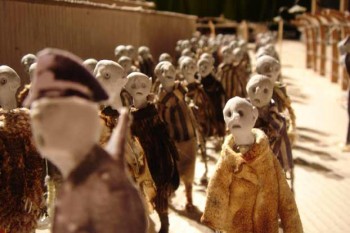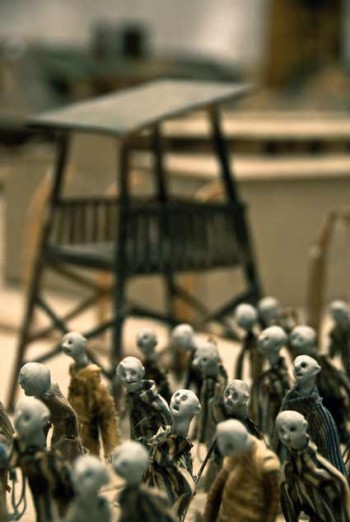Concentration Kamp: Bethany Simons talks with Pauline Kalker
Audiences are invited to witness the world of the holocaust in Hotel Modern’s acclaimed production Kamp, debuting in Australia at the Adelaide Festival this month.
Bethany Simons chatted with co-founder Pauline Kalker to find out what audiences can expect from this challenging work.

As I sit in my kitchen waiting for the phone company to connect me with Pauline Kalker in Rotterdam, I’m flicking through the press notes for Kamp, a production by Dutch theatre company Hotel Modern. It appears that this group’s trademark is a creative combination of film, puppetry, live music and performance and I’m fascinated to learn more.
Inspired by the story of her grandfather who died in Auschwitz during the Second World War, Kalker begins by speaking of her experiences growing up in a home where this terrible fact was felt more than discussed.
“Growing up there was not so much talking about it, but there was always his photo on my father’s desk. Of course I knew he died in Auschwitz, that was told to me, but mostly I could feel my father’s love and grief for his own father.”
This idea of feeling rather than speaking is echoed in the stylistic qualities of Kamp. Using no dialogue, the actors move around a small-scale model of a concentration camp, operating and manipulating set elements and 3000 miniature puppets in order to create the sense of an operational city on stage. The audience, seated at the edges of the model watching the actors, are given different points of view through the use of film.

As Kalker says, “There are two sides: the audience watch the city, and we have cameras that zoom into the faces of the individual puppets. With cameras we look in and then with our model we can give an idea of the scale and operation of the camp. We show the machinery of this concentration camp more than the psychological context of prisoners. Like wide shots and close ups are used in film to tell a story, that’s the movie language that we use.”
Though film is a crucial element of the work, what is special about theatre is that all of the action is happening live, resulting in the audience feeling like eyewitnesses to the crimes that are taking place in front of them.
[pull_left]The show is so silent it’s suffocating a bit. In the end people start to breathe again. We help them with that by inviting them to ask questions; they talk with us and with each other[/pull_left]
“The show is so silent it’s suffocating a bit. In the end people start to breathe again. We help them with that by inviting them to ask questions; they talk with us and with each other. I don’t know what they talk about to each other, but to us they ask what the puppets are made of and why we made this show.”
Given the dark subject-matter, Kalker admits that she is grateful for any audience member who shows enough interest to turn up at the theatre in the first place.
“It is very courageous of audiences to go because they know they are not going to have a happy end. Every member of the audience will have his own reason why he goes there; maybe he’s interested in history or has a family connection. I appreciate that people actually go, opening their eyes for it and also their heart for what happened. I hope for every member of the audience that, in a way, this curiosity is somehow fulfilled”.
Kalker shared that those who don’t have a personal connection with the camps have also been moved and shocked about what happened; she sees this as a positive response also. Although Kamp is not designed to be educational it has helped people of all ages understand more about this horrific event.

In addition to contact microphones in the floor of the model Ruud van der Pluijm has designed a soundscape of wind and industrial sounds to accompany the action. The sound of silence is also a powerful means to convey the feeling of loneliness. As there is no dialogue and none of the action is explained Kalker feels that a mixture of ages in the audience is best for garnering a deeper response.
“Older people know more and are closer to the war. I think it’s better for the performance if there is more experience there, people who are wiser and older. Some things like the gas chambers, we show what happens, we don’t explain. We do it with puppets, stylistic, no screaming. With only young people in an audience then you don’t feel the depth, but if it’s a mixture you feel from the other members of the audience”.
Having read a number of reviews and interviews about Hotel Modern’s experiences performing and touring Kamp, I was interested to hear Kalker’s view on what a ‘positive response’ to a work means in the context of this show.
“Moved, I think, is what is positive. The best response was from some Auschwitz survivors; we talked to them when we were developing the show, interviewing them about what happened and what their experiences were. They came to see the show and were very positive. One of the survivors came back two times bringing her family and friends. It gives them a little bit of an idea that people want to understand them. It helps them talk about it. That was for me the biggest compliment”.
Founded in 1997 by Pauline Kalker, Herman Helle and Arlène Hoornweg, Hotel Modern first worked together to develop their signature theatre language. There is no one director, rather a collaborative effort described by Kalker as working together like a band to create new works. And that’s exactly what they do. Whether sad, funny, or touching, the universal themes and creative presentation of this theatre company’s work have made the world sit up and take notice. For Kalker, at least, it’s a dream come true, touring the world and having a full-time gig as a theatre maker.
“It is more than full time, actually. Since I was 13 it was my ambition to create my own theatre company, but I never thought it would tour internationally. That wasn’t planned, but it happened. I’m not part of the cast of Kamp for Australia, but I still have the feeling that I also go there. I was very much involved in this show; it’s part of me”.
Kamp plays at the Adelaide Festival from Tue 12 – Sun 17 March
Space Theatre, Adelaide Festival Centre
